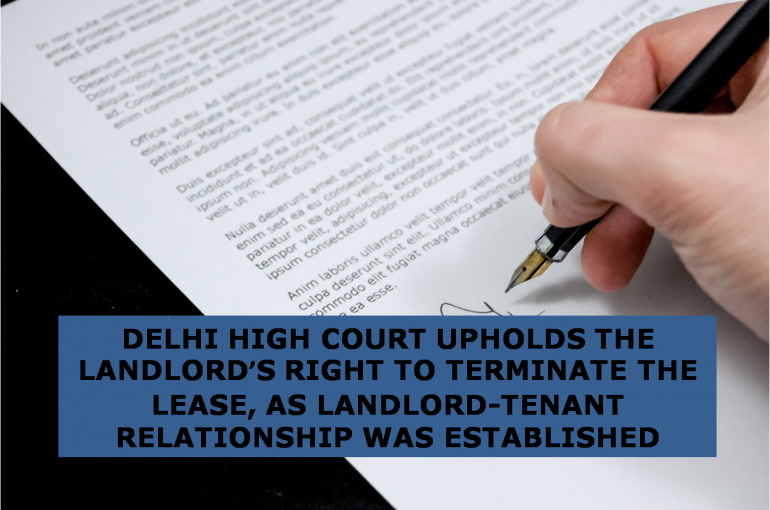DELHI HIGH COURT UPHOLDS THE LANDLORD’S RIGHT TO TERMINATE THE LEASE, AS LANDLORD-TENANT RELATIONSHIP WAS ESTABLISHED
A single Judge Bench of the Delhi High Court, comprising of Justice Jasmeet Singh passed a judgement dated 22.12.2023 in Nawabuddin v. Shafiulla @ Raja RFA 462/2023, where Justice Jasmeet Singh upheld the decision of Trial Court that held that once a landlord-tenant relationship is established, the landlord has the right to terminate the lease agreement as per the terms of such agreement. The Delhi High Court was deciding an Appeal against the Trial Court Order dated 21.02.2023 passed in “Shafiullah @ Raja v. Salman Malik and others C.S. No. 55 of 2019.
Facts:
1) The Appellant filed an Appeal against the Order of Trial Court dated 21.02.2023 hereinafter ‘Impugned Order’. The Impugned Order directed the Appellant and Mr. Salman Malik (Defendant No.1 therein) to vacate the Suit Premises and handover the possession to the Respondent. This led to filing of the Appeal in the Delhi High Court.
2) The Appellant and the Defendant No.1 were the Tenants of the shops owned by the Respondent-Landlord. The contentions made by the Respondent in the Trial Court was that the Appellant and the Defendant No.1 were irregular at paying the rent and electricity bills to him and thus were illegally occupying the shops rented to them, vide Lease Deed dated 27.08.2016. The Tenanted Premises were given for commercial purposes for a fixed period of 11 months from 15.08.2016 to 14.07.2017 at a monthly rent of Rs. 30,000/- per month. This was the First Agreement between the Parties.
3) However, on expiry of lease period, both the Appellant and the Defendant No.1 requested the Respondent to extend the lease for a further period of 11 months and convinced the Respondent to increase the rent by 30% per annum instead of 10% per annum as per Clause 14 of the First Agreement.
4) That after May 2018, the Appellant and the Defendant No. 1 stopped paying rent and since the Appellant and the Defendant No. 1 were in default of paying rent, the Respondent sought to recover the same. As the Appellant and the Defendant No. 1 were in unauthorized possession of the Tenanted Premises without any payment of rent or arrears, the Respondent issued Legal Notice to both of them to vacate the Tenanted Premises. The Respondent also sent Notice for Termination of Tenancy under Section 106 of the Transfer of Property Act, 1882 (TPA) (Duration of certain leases in absence of written contract or local usage) to both the Parties. As no reply was filed by either of the Parties, the Respondent approached the Court to seek remedy.
5) When the matter was perused by the Trial Court, the Appellant and the Defendant No.1 sought adjournments to file their Written Statements and subsequently, their right to file the same was closed and their defense was also struck off by the Trial Court. The Appellant asserted that as per the Second Agreement, the rate of rent was decided at Rs. 5000/- per month which he paid regularly and also paid a sum of Rs. 10 Lakhs to the Respondent as lump-sum amount.
6) The Trial Court held that the Parties have admitted to the Landlord-Tenant relationship and thus passed a Preliminary Decree, vide Order dated 21.02.2023, in favour of the Respondent and asked the Defendant and the Appellant to handover the possession of the Property.
7) In the present Appeal, the Appellant contended that the Trial Court did not consider the Second Agreement which provides the lease period of 10 years from 01.07.2018 to 30.06.2028 at a monthly rental of Rs. 5,000/- per month and thus the Appellant-Tenant cannot be dispossessed.
Issues:
I) Whether the relationship of Landlord and Tenant was valid in the present case?
II) Whether the Trial Court was justified in giving possession to the Respondent?
Decision of Delhi High Court
i) The High Court relied on Order 12 Rule 6 of the Code of Civil Procedure 1908 (CPC) (Judgment on admissions). The High Court held that as the defense of the Appellants was struck off at the trial stage, and the only submission made by them was a Reply to the Application filed by the Respondent-Landlord, which was not a justifiable defense. Also, following that reply, it was evident that there existed a Landlord-Tenant relationship between the Parties.
ii) Also if the Second Agreement was assumed to be true which was expressly relied on by the Appellant-Tenant, it also satisfied the Court regarding existence of Landlord-Tenant relationship as there was no denial of such tenancy by the Appellant.
iii) Moreover the High Court of Delhi was of the view that Notice of Termination of Tenancy sent by the Respondent was duly served to the Appellant, therefore, the tenancy of the Appellant was terminated upon receiving summons. Hence, the argument of the Appellant that notice under Section 106 of TPA was not served upon him does not hold any merit and was thus rejected. Therefore, the High Court concluded that all the ingredients of Order 12 Rule 6 CPC have been correctly satisfied and the Order of Trial Court would not require any interference. Thus, the Appeal filed by the Appellant-Tenant was dismissed.
Conclusion:
This case throws light on the importance of filing a written statement in a Court as it is a primary pleading and it cannot be substituted by a reply. The Court provided that if every reply is counted as a defense pleading, then the purpose of filing written statement would become redundant as the plaintiff and the Court is required to know as to what is the defense taken by the defendant. Hence, the High Court provided that the Trial Court rightly proceeded in the manner as per law and hence upheld the decision given by the Trial Court.
Arjav Jain
Associate
The Indian Lawyer and Allied Services





































Leave a Reply